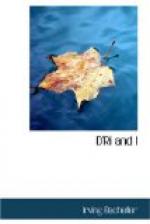We were off at sunrise, on a road that grew rougher every mile. At noon we came to a river so swollen as to make a dangerous ford. After dinner my father waded in, going hips under where the water was deep and swift. Then he cut a long pole and took my mother on his shoulders and entered the broad stream, steadying himself with the pole. When she had got down safe on the other side, he came back for grandmother and my sisters, and took them over in the same way. D’ri, meanwhile, bound up the feather beds and carried them on his head, leaving the dog and me to tend the sheep. All our blankets and clothing were carried across in the same manner. Then I mounted the cart, with my rooster, lashing the oxen till they took to the stream. They had tied the bell-wether to the axle, and, as I started, men and dog drove the sheep after me. The oxen wallowed in the deep water, and our sheep, after some hesitation, began to swim. The big cart floated like a raft part of the way, and we landed with no great difficulty. Farther on, the road became nothing better than a rude trail, where, frequently, we had to stop and chop through heavy logs and roll them away. On a steep hillside the oxen fell, breaking the tongue, and the cart tipped sidewise and rolled bottom up. My rooster was badly flung about, and began crowing and flapping as the basket settled. When I opened it, he flew out, running for his life, as if finally resolved to quit us. Fortunately, we were all walking, and nobody was hurt. My father and D’ri were busy half a day “righting up,” as they called it, mending the tongue and cover, and getting the cart on its wheels and down the steep pitch.
After two days of trail travel we came out on the Chateaugay road, stopping awhile to bait our sheep and cattle on the tame grass and tender briers. It was a great joy to see the clear road, with here and there a settler’s cabin, its yard aglow with the marigold, the hollyhock, and the fragrant honeysuckle. We got to the tavern at Chateaugay about dusk, and put up for the night, as becomes a Christian.
Next afternoon we came to rough roads again, camping at sundown along the shore of a noisy brook. The dog began to bark fiercely while supper was making, and scurried off into a thicket.
D’ri was stooping over, cooking the meat. He rose and listened.
“Thet air dog’s a leetle scairt,” said he. “Guess we better go ‘n’ see whut ’s the matter.”
He took his rifle and I my sword,—I never thought of another weapon,—making off through the brush. The dog came whining to D’ri and rushing on, eager for us to follow. We hurried after him, and in a moment D’ri and the dog, who were ahead of me, halted suddenly.
“It ’s a painter,” said D’ri, as I came up. “See ’im in thet air tree-top. I ’ll larrup ‘im with Ol’ Beeswax, then jes’ like es not he ‘ll mek some music. Better grab holt o’ the dog. ’T won’t dew fer ’im to git tew rambunctious, er the fust thing he knows he won’t hev no insides in ’im.”




